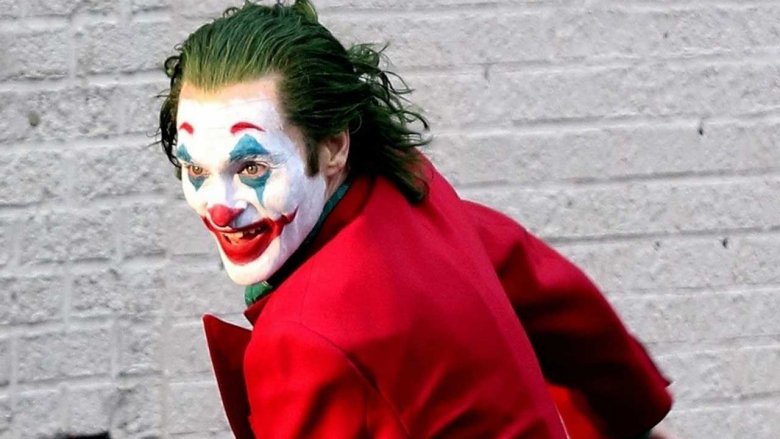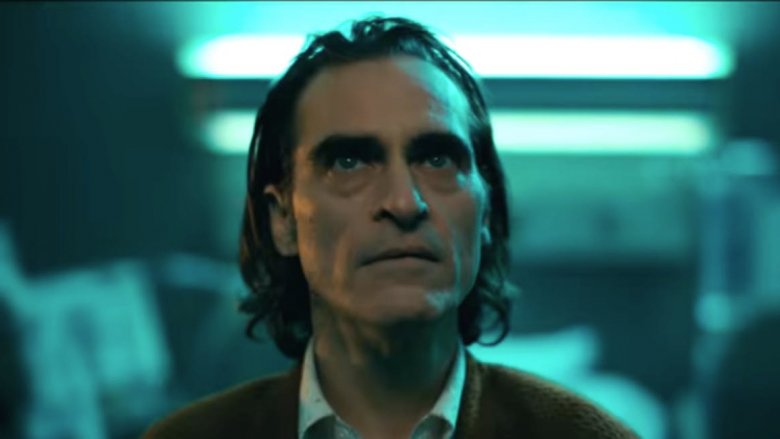The 'Radical Changes' Made To Joker In The Middle Of Filming
Creating a unique take on the Joker was a bit of a moving target for Joaquin Phoenix.
The actor recently sat down with the ReelBlend podcast to discuss the difficulties that he and director Todd Phillips had in nailing down the right characterization during the filming of Joker, and it turns out that the version we see onscreen is quite different from what they originally envisioned — in fact, Phoenix revealed that major changes were made to the character in the middle of filming.
Before we dive into Phoenix's remarks, it should be said that by all accounts, the end result of his process was a performance that will likely go down as a legendary one in the annals of film history. As unlikely as it might have seemed a dozen years ago that two different actors would win Academy Awards for portraying the Joker barely a decade apart, that may very well be the case; the late Heath Ledger received a posthumous Best Supporting Actor Oscar for taking on the role in 2008's The Dark Knight, and it's starting to look more and more likely that Phoenix will follow suit.
According to the star, we can actually thank the suits at Warner Bros. not only for trusting in Phillips' vision for his film, but for not interfering with his star's path to finding the right notes for the character of Arthur Fleck, the failed comedian and rent-a-clown who becomes Gotham City's Clown Prince of Crime.
"The freedom that we had from Warner Bros. to kind of shoot it and discover it was really key. More so than you might imagine, because there were some really radical changes to the character several weeks into shooting," Phoenix explained. "It's always the case when you make movies, you start off in this vacuum, you're alone in a house and you're reading through the script, and you start imagining things and you start playing with it, and rehearsing with yourself, and I think it always evolves. In this one I'm not sure what happened, but I had an idea for something — it sounds so stupid now."
So stupid, apparently, that Phoenix didn't care to elaborate on exactly what it was. But he did reveal that he based his initial performance on a real-life case study of a mentally ill individual that he had come across in the course of researching his role.
"I thought it was really good," he said with a chuckle. "We just started going down a particular road with Arthur with approaching that character and his behavior, and it was based on a reference that I had found, this kid that is undergoing a psychiatric evaluation, and it was really interesting in a particular way of behaving, which I thought was applicable. And it might have been, at times."
How did the Joker change midway through filming?
After shooting a good portion of the "Arthur" scenes before the character's metamorphosis into the Joker, though, Phoenix's approach to the character was reshaped as a result of (oddly enough) the shooting schedule. The "Joker" scenes after the character's transformation had to be shot in the middle of the production — and while Phoenix was none too happy about this at first, he found that jumping directly into the over-the-top, full-blown Joker version of the Arthur gave him insight into the character that he'd lacked before.
"The sixth week of shooting was the first time that I played Joker," Phoenix remembered. "I was really angry about that, because I thought that it should wait until the end, and I didn't want to kind of shoot it in the middle, but for several reasons we had to. We shot those sequences I think for four days, and we finished, and on the last day of the week we shot the bathroom scene with Thomas Wayne."
Something about shooting that scene produced a giant click for Phoenix, and when he discussed it with Phillips afterwards, he was pleased to find that the director had heard it, too.
"That was a weird transition and it was a struggle, and after that — after playing Joker... Todd and I got together and we talked about everything we shot. And I just said, 'I think that we've been missing something, and I feel like we're going down a road that seems wrong in both the look, the hair is wrong, the way I'm wearing the wardrobe is wrong, and a lot of the behavior.' So we kind of, in that moment and over that weekend, kind of reconceived the character and kind of realized the mistakes we had made."
While he doesn't explicitly state it, it's implied by Phoenix's comments that the cast and crew then went back to reshoot some of those earlier scenes — which was only possible because, before shooting had even started, Phillips had requested more filming days than he thought he would need from the studio, apparently in the event that just such adjustments would have to be made. This would constitute a rare case in which a major studio put actorly, artistic concerns above such pragmatic considerations as budget and schedule — and considering that the entire internet was ready to hand Phoenix an Oscar on the strength of the film's trailers alone, it appears to have paid off in spades.
"It was a really crazy time, but I became so grateful and thankful we shot [the] Joker [sequences] when we did, because exploring that side of the character really allowed me to see this other side. There are just some things that you can't anticipate, and I think especially with this character it's just alive in a way that other characters aren't, and you can't put your finger on it. It was a wild process. I've never experienced anything quite like that."
Yes, and we have never experienced anything quite like Joker. It's certainly a film with something to say, but you'll get many different opinions regarding just what that is depending upon whom you ask. Considering the wildly divided reactions it's drawn, there's really only one way to ascertain what you believe its message to be: go see it.
Joker is in theaters now.

